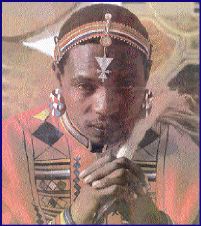 |
Once a primary member of Bayete, Jabu Khanyile is now the driving force for the latest versions of the band, as well as its mastermind. Khanyile's path to the present is somewhat of a circuitous one — his father is described as "a playboy," while his mother passed away early in Khanyile's life. With existence becoming a struggle, and little support, Khanyile was unable to finish school, and found himself unsuited to holding down any sort of regular job. The major influence from his father came in the form of Mbube music, performed by his father and friends on Sunday afternoons.
Khanyile's elder brother John, a member of a group called Editions, who released several popular singles, eventually bought Jabu a guitar, after allowing him to come along to various Editions gigs. Khanyile taught himself enough guitar to be able to busk for a living. Young Khanyile's interests also extended to drums and percussion; whenever possible, he would get behind the drumkit at Editions gigs.
When Editions broke up, Khanyile was approached by the group's manager with the idea of re-forming the band — keeping the name, but using younger musicians. While the new band quickly landed a record deal, the political climate led to various band members fleeing the country or going into hiding. Not to be stopped, Khanyile once again recruited a new set of musicians. This version of the band recorded Izinyembezi to general acclaim, but fell apart during the recording of a new album.
Khanyile then joined the Movers, who promptly achieved a hit with "Inhlonipho," only to fall prey to internal problems as they achieved success. Disgusted with the infighting, Khanyile left the band, auditioning for the drummer's throne in a new band, Bayete.
A brass-driven outfit with its heart firmly in African territory and a somewhat politicized attitude, Bayete had an immediate appeal to black South Africans whose frame of reference was extremely uncertain just prior to the abandonment of apartheid policies. The first Bayete album, Mbombela, released in 1987, spoke out about the economic realities of life in both the country and the townships, and about the shattering of families. Hareyeng Haye appeared in 1990, with the release of "Mbube" generating a significant hit (one adopted by many people, who would replace "Mbube" with "Mbumbe," which means "unity").
Unity was far from the minds of those in Bayete, however, and the band split in 1993. Khanyile quickly assembled a new collection of players and got back to work, recording Mmalo-We. The new album not only continued the momentum gathered by the band to that point, earning a gold record and several South African Music Awards, it also attracted the attention of Island Records maven Chris Blackwell, who acquired the album for worldwide release. 1996's Umkhaya-Lo continues Khanyile's exploration of African musical styles, combining history with contemporary musical ideas. The 1997 Africa Unite is a compilation of tracks from Mmalo-We and Umkhaya-Lo. — Steven McDonald
|
|